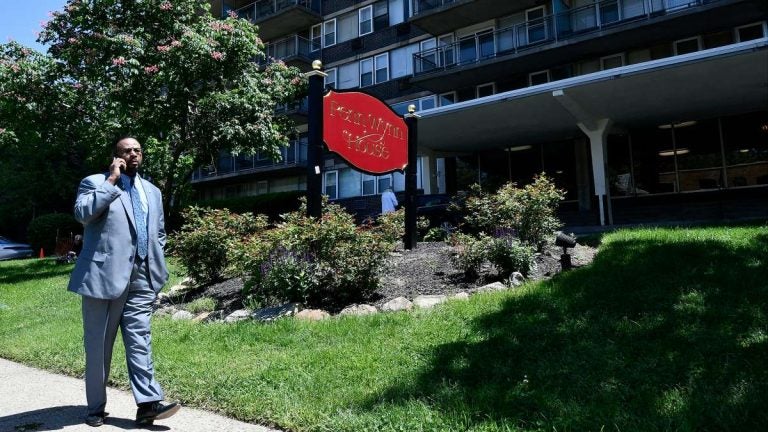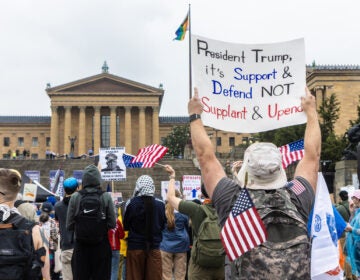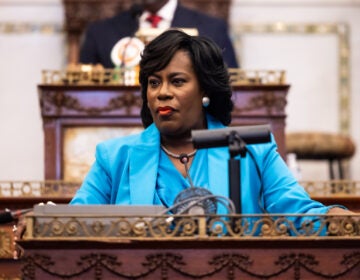City Council downsizes new protections for renters in ‘good cause’ bill
A good cause would include non-payment of rent, nuisance behavior, or breaking the term of a lease.

Councilman Curtis Jones, Jr. arrives ahead of an anti-eviction rally organized by the Philadelphia Tenants Union (Bastiaan Slabbers for WHYY)
This article originally appeared on PlanPhilly.
—
On Thursday, Councilman Curtis Jones substantially scaled back a bill meant to protect Philadelphia renters.
Jones introduced amendments to his “good cause” eviction legislation that would make it applicable only to leases with a duration shorter than a year. Most leases in the city are annual.
“We wanted to bring it down to reality,” said Jones. “Over the last year we’ve been whittling away and adding to the legislation and I think we are close as we are going to get without changing the whole dynamic of the bill.”
Originally introduced in October of 2017, the bill would require that landlords have a “good cause” for evicting a tenant upon the expiration of a lease, or at any other time. A good cause would include non-payment of rent, nuisance behavior, or breaking the term of a lease.
The bill would not prevent landlords from hiking the rent at the end of a lease, but it would require owners to give tenants notice of at least 30 days before raising the rent, filing an eviction or making any other big change to a lease. If the bill becomes law, tenants would be empowered to challenge evictions that don’t meet “good cause” standards in court or before the Fair Housing Commission.
Jones’s policy director, Samantha Williams, said that his office introduced the amendment because of concerns about the vulnerability of renters who have month-to-month leases. These renters were the most at-risk, Williams said.
Landlord groups told PlanPhilly that the overwhelming majority of leases in the city are for a year. But there are landlords who rely on month-to-month, often in the lower rungs of the housing market.
Victor Pinckney, first vice president of Home Owners Association of Philadelphia (HAPCO), a landlord trade association, said that most of his leases are month-to-month. If the bill is passed into law, he will consider changing them to year-to-year to avoid the new regulations, he said.
“I understand what he [Jones] is trying to do, he wants to get something passed one way or another,” said Pinckney. “But the main reason I do 30 day leases is that if someone wants to move, they are going to move. You can sue them for breaking lease but there are ways around that. And then if there’s someone in a property I want to get rid of it who is being a nuisance, that’s easier for me.”
During the public comment session of Thursday’s City Council meeting, many renters and activists gave passionate testimony in favor of the unamended bill.
Jones said that he anticipated advocates might believe his amendments watered down the “good cause” eviction bill, but that just means it is a good compromise.
“Some of the best legislation I’ve ever done are one where everyone is just a little bit ticked off,” said Jones. “This will do that.”
The Philadelphia Tenants Union, one of the principal advocates for the just cause bill, did not oppose the amendment. They see it as a beginning that they hope to expand upon.
“We see more and more tenants being forced on to month-to-month leases,” said David Thompson, an organizer with the Philadelphia Tenants Union. “I don’t know the share, but I see them all the time with poor and low income tenants, to say nothing of the year-long leases that then default to month to month.”
HAPCO is still deeply unhappy with the bill, however, and their lawyers have advised that it is probably unconstitutional.
“There is no severability clause in the bill,” wrote HAPCO’s lawyer, Paul Cohen, in an email to members. “ That means if one clause is invalid, the entire bill is invalid. If this bill does get passed, I think we have a really good shot at getting it overturned in the court.”
The bill included other amendments, including a provision proposed by Allan Domb that would allow landlords to evict a tenant without good cause if they need the unit to house “a close family member.” It also includes a provision stating that if the landlord does not provide proper notice to a tenant, the lease will revert to a month-to-month lease.
From the beginning there were voices who cautioned that “good cause” eviction laws only help a small minority of renters unless they are paired with rent control bills. Jones has not advocated for rent control.
The logic for pairing protections against evictions with such a policy stems from the fact that the vast majority of tenants find themselves evicted for failing to keep up with the bills.
“In most cities evictions are for cause: it’s because you fell behind on the rent,” Matthew Desmond, author of the Pulitzer Prize winning Evicted: Poverty and Profit in the American City, said in a 2017 interview. “‘Just cause laws wouldn’t affect those cases. Some housing advocates say it’s a piece of the puzzle. I would agree, but we also need to include legislation and policies that help the vast majority of evicted families who are evicted for cause.”
Jones says he will bring his amended bill up for a final vote next week. Earlier this week Mayor Jim Kenney told WHYY’s Marty Moss-Coane that his administration is discussing the possibility of funding legal aid for all low-income renters who come before rent court, a reform that Desmond and renter advocates say could dramatically temper the eviction crisis.
WHYY is your source for fact-based, in-depth journalism and information. As a nonprofit organization, we rely on financial support from readers like you. Please give today.







